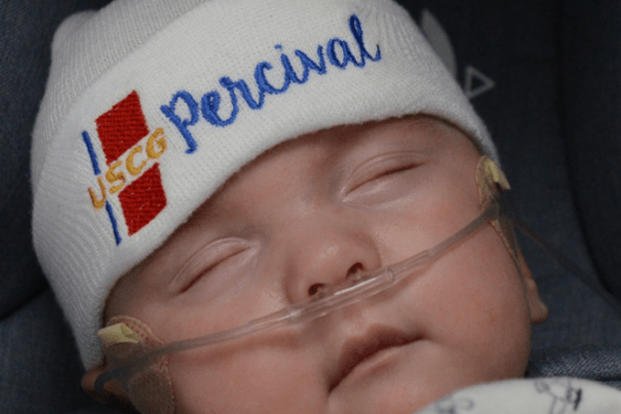When Kodiak, Alaska, residents Courtney Ann and Colin Spencer found out they were expecting a child, it was one of the happiest days of their lives. But when their son Percival was born just 22 weeks and two days into the pregnancy, it was one of the scariest.
The couple struggled with fertility and wanted nothing more than to become parents. After four years of treatments, they learned Courtney was pregnant. But early on in the pregnancy, Courtney showed signs of complications and was ordered to go on bedrest by her doctor. At around the 17th week, she awoke to realize that something was very wrong.
Colin, a Coast Guard aviation maintenance technician at Air Station Kodiak, received a call from Courtney and rushed home to take her to the emergency room. Doctors immediately recognized the need for Courtney to fly to Anchorage for treatment.
Most flights were grounded in Kodiak that day due to severely high winds gusting up to around 70 mph. Their medevac to Anchorage was delayed until 11 p.m. Eventually getting airborne and flying through blinding snow, the couple did their best to suppress their anxiety.
Upon arriving in Anchorage, doctors recognized that Courtney would need a fairly simple operation to prevent her baby from being born far too early, by sewing two stitches to help keep him in the womb.
The surgery was a success at 17 weeks and four days.
Courtney was free to leave the hospital, but doctors insisted the couple remain in the Anchorage area for the duration of the pregnancy.
They stayed at the Fisher House on Joint Base Elmendorf Richardson.
The Fisher House Foundation builds homes where military and veteran families can stay free of charge, while a loved one is either in the hospital, or needs to be close to one.
These homes are located at military and Veteran Affairs medical centers around the world.
Since inception, the program has saved military and veteran families nearly half a billion dollars in costs for lodging and transportation.
Colin was able to work at a job site provided by leaders at Coast Guard Sector Anchorage, while Courtney remained on bedrest. The pregnancy was a constant roller coaster for both parents, terrified that they would lose their son.
Courtney continued to have random cramping and complications that landed her in the emergency room about once a week.
Courtney and Colin giggled over one ER visit that led doctors to the realization that her pains were coming from Percival literally kicking her cervix.
"He was trying to kick his way out," laughed Courtney.
Just two days past the 22-week mark, Courtney went into labor.
Doctors at the Providence Neonatal Intensive Care Unit determined that Courtney needed an emergency Cesarean section operation. Percival made his way into the world on Jan. 13, 2019. He was born still in his bag of water, so he was spared the birth trauma that normal babies experience.
"The youngest baby ever to survive was about 21 weeks and four days," said Courtney. "We were told Percival was about the fifth youngest baby ever to be born in Alaska. Some doctors may have decided not to try to save a baby as young as Percival. Statistically speaking, odds were not in his favor. Viability has everything to do with the baby's lungs. A normal baby's lungs are actually the last thing to develop, and they typically don't begin to develop until the 21-22 week mark."
The Spencers said the Providence NICU in Anchorage has a reputation for trying to save babies born extremely prematurely.
"Percival came out, took two gulps of air and screamed," said Colin. "They looked at him and said 'this kid's a fighter--let's do it.'" said Colin. "I called our families and said 'Hey, guess what? You're all going to be grandparents today! I was elated, I was a dad."
Both parents noted Percival was born with his eyes still sealed shut.
About six days later, they got to hold him.
"It was likely, but not confirmed, that he was the youngest gestational baby to be held skin-to-skin by a parent at just 23 weeks," said Colin. "We actually sent off to Guinness to find out."
After being born, Percival was intubated on a ventilator to help his lungs continue to develop.
He stayed in the NICU for 169 days.
The Spencers attribute their strong bond with Percival to his exceptionally early birth.
"I've literally known Percival since he was a second trimester fetus," said Colin. "He's held my hand since then."
The Spencers departed Anchorage for Kodiak on July 3, 2019, to move out of their home and prepare for their next adventure.
The Spencer family has since moved from Kodiak to Cape Cod, Massachusetts, due to Percival's needs. They were sad to leave, they said.
"If we get to come back to the island, it would be my third tour in Kodiak," said Colin. "We'd move back there in a heartbeat."
Meanwhile, the Spencers said Percival is getting stronger each day.
Lt. Cmdr. Gary Pepper, a Coast Guard chaplain, visited with the Spencers as often as possible during their time in Anchorage.
"When I went in to visit the family, what stood out to me most was how Colin would diligently monitor all the readings on the life support equipment, constantly keeping tabs on his vitals and notifying doctors of anything that didn't seem right. The professionalism and expertise of the medical staff, and the love this couple has for one another and for their son all resulted in his miraculous survival."















